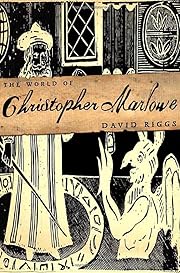

Click on a thumbnail to go to Google Books.
|
Loading... The World of Christopher Marlowe (2004)by David Riggs
 None No current Talk conversations about this book. A superb book. As so little is known about Marlowe's life the conundrum for any potential biographer is how to find a new way to contextualise his life and his works. Riggs takes the seemingly simple approach of exploring contemporary Elizabethan life and the opportunities and restrictions that this would have imposed on the young playwright. The result is a rich and atmospheric narrative, which really brings his subject to life. no reviews | add a review
This is the definitive book about the man who revolutionised English drama and English poetry - and was murdered in his prime. David Riggs evokes the atmosphere and texture of Marlowe's life, from the stench and poverty of a childhood spent near Canterbury's abattoirs to the fanatical pursuit of classical learning at school. Marlowe won a place at Cambridge University, where he entered its world of eighteen-hour working days, religious intrigue and twilight homosexuality. The gifted student was not immune to the passions and fears of the wider society, and Riggs describes the mood of England in those years when Elizabeth's crown was anything but secure, and Spain and the Papacy were determined to overthrow her regime. Looming above everything is the Elizabethan state and its spy rings, with which Marlowe was already involved by the time he left Cambridge. His undercover missions brought him into contact with Catholic conspirators who were plotting to kill the Queen; yet as a playwright and thinker he was attracted to the most unorthodox and threatening idea of all - atheism. Marlowe brought a wonderful new lightness and musicality to English verse, but was held in little esteem dur No library descriptions found. |
Current DiscussionsNonePopular covers
 Google Books — Loading... Google Books — Loading...GenresMelvil Decimal System (DDC)822.3Literature English & Old English literatures English drama Elizabethan 1558-1625LC ClassificationRatingAverage: (3.88) (3.88)
Is this you?Become a LibraryThing Author. |
||||||||||||||||||||||||||||||||||||||||||||||||||||||||||||||||||||||||||||||||||||||||||||||||||||||||||||||||||||||||
David Riggs solves the problem in two ways, he fills in the contextual details and then links this to the plays and the poetry, while piecing together as much as is known of Marlowe’s life, clearly indicating where there are gaps in his story. Marlowe was murdered when he was thirty and some of the details of the crime are known, but why he was murdered is still the stuff of conjecture: it may have been retribution for his work in spying and informing on others, it may have been because his views were seen as a threat to the queen and the state, or it may have been a simple argument over money. Riggs tells us the story as far as it is known and queries the more blatant conjectures, without advancing his own particular theory. He does however fill in some of the background of the concerns of the government, of Marlowe and other jobbing writers that could be pertinent to the murder, so giving the reader the information required to make his own judgement.
Riggs’ biography is written chronologically with the first six chapters concerned with Marlowe’s education. Knowing which school and colleges he attended allows the author to enter into some detail as to what Marlowe was taught and how he fitted into the social milieu, By careful readings of the plays and poems Riggs is able to identify themes and issues that were used or rejected by the young author. He builds an educated picture of Marlowe and the tools he had to hand to create his literature and how he developed what had gone before and Riggs is in no doubt that his subject warrants the acclaim he now receives.
He offered spectators a thrilling repertory of poetic tragedies that spoke to their most urgent concerns – grinding poverty, class conflict, erotic desire, religious dissent, and the fear of hell. Marlowe’s eight-year career exploded with masterpieces. Tamburlaine the Great, Dr Faustus, The Jew of Malta, and Edward II transformed the Elizabethan stage into a place of astonishing creativity.
There is a chapter on each of the plays with Riggs guiding the reader through the themes and ideas that he has garnered from his own reading. Space does not allow him to carry out an in depth study, but there is enough here to stimulate the prospective reader of Marlowe’s oeuvre.
This is an excellent biography that serves also to stimulate a reading of Marlowe’s texts, providing plenty of context to the life and works of the author. There is much criticism and biographical work on Marlowe available for the interested reader, but Riggs provides something that gives more than just an introduction; a critique and biography in its own write and I would rate it as 4 stars. (